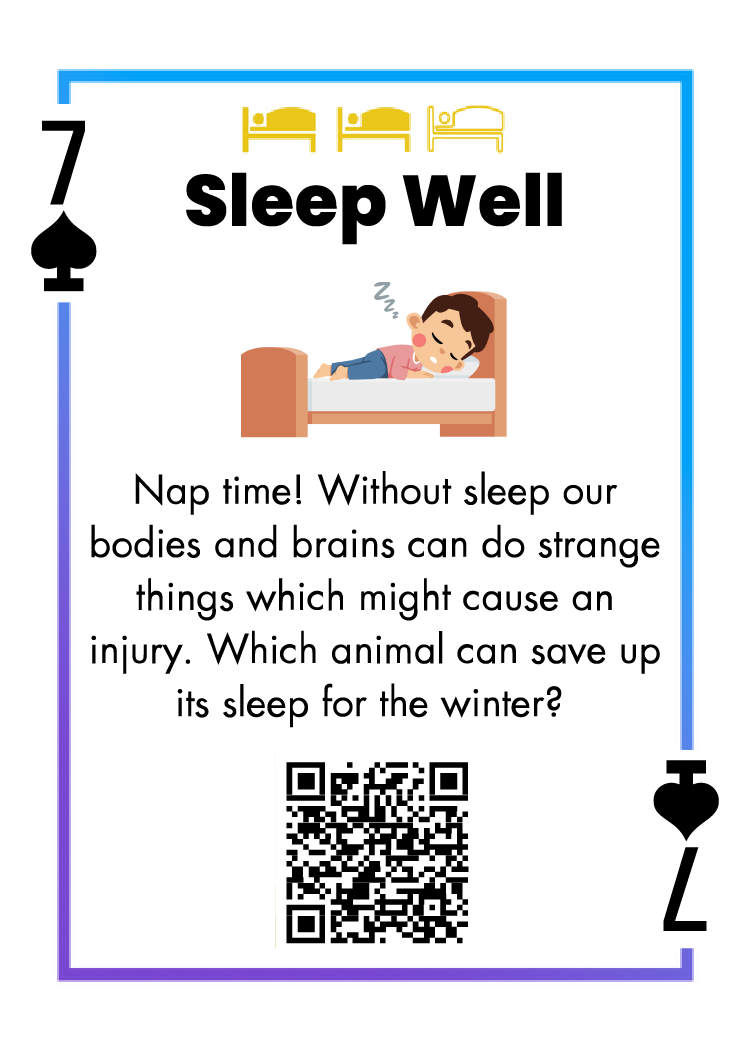The 1% Club




7 of Spades
All Creatures Need Sleep for Survival

Napping!
For animals of all species and sizes, sleep is essential for survival. It’s the same for us too! Giving our bodies a chance to recharge and repair with a quick nap during the day if you need.
Question Time!
- What animal sleeps the longest?
- What animal needs the shortest amount of sleep?
- What animal changes colour when they sleep?
- What happens to our brains and bodies when we’re asleep?
Answers in the ‘Do you want to know more’ section
Ensure to get about 9 hours of sleep each night to allow your body to recover. This is about the time night monkeys, queen ants and dolphins sleep!
Even the kings of the animal kingdom need rest, and so do we!
Sleep helps us feel happier and healthier. Getting enough sleep gives you the energy to enjoy all the things you love to do.
Sleep is important for helping your brain grow and develop. If you don’t get enough sleep, it can affect how your brain works and how you feel, making it harder to think clearly and manage your mood compared to getting enough rest.1
Small changes CAN make a big difference – that’s what the 1% Kids’ Club is all about.
Answers:
- Koalas are the sleep champions; they can rest for up to 22 hours a day! Sloths are second, with still an impressive time of 20 hours a day.
- Elephants get the least amount of sleep, with only 2 hours! They sometimes even sleep standing up. Then Donkeys, who sleep about 3 hours in about 5-minute naps to protect themselves. These animals have special ways to stay alert and safe even with less sleep!
- Octopuses change colour whilst they are dreaming and twitch their tentacles!
- When we sleep, our brains clean out waste and help us remember things better. Our bodies repair muscles and bones, giving us energy for the next day.2
- Explaining the importance of sleep and the consequences of not getting enough can be beneficial for children. Check out this fun video
- Send home a sleep diary for each child to fill out, where they can record their bedtime, wake-up time, sleep quality and any dreams they remember. This activity can help identify those who may be struggling with sleep or not getting enough rest. Reviewing these diaries can offer valuable insights into their sleep patterns and help address any issues.
- If you have the time, you can play sleeping games as brain breaks or during any after-school activities. Follow these videos for some activity ideas:
- Establish a consistent bedtime routine to help your child fall asleep easily and enjoy a restful night’s sleep.
- Support and encourage them to fill out their sleep diary, which can help them reflect on their sleep habits and identify ways to improve, such as adjusting their nighttime routine.
- Ask how they slept and help where you can if they are struggling. Check out this page for further advice: 2-How_to_help_your_kids…_sleep.pdf (sparklers.org.nz)
- Contie, V. (2022b, August 30). Children’s sleep linked to brain development.
Retrieved from National Institutes of Health (NIH) website: https://www.nih.gov/news-events/nih-research-matters/children-s-sleep-linked-brain-development - Pickford, M. (n.d.). Patient Information Leaflet Paediatric Sleep Helping your child get a good night’s sleep 2.
Retrieved from https://media.gosh.nhs.uk/documents/GOSH_Sleep_Hygiene_in_children.pdf

